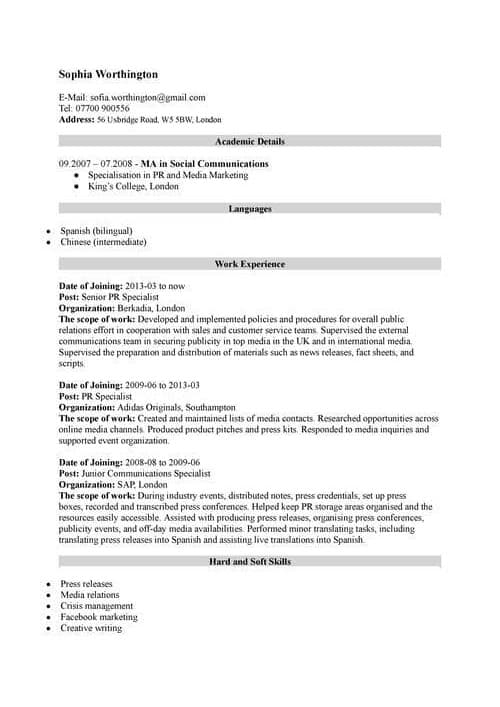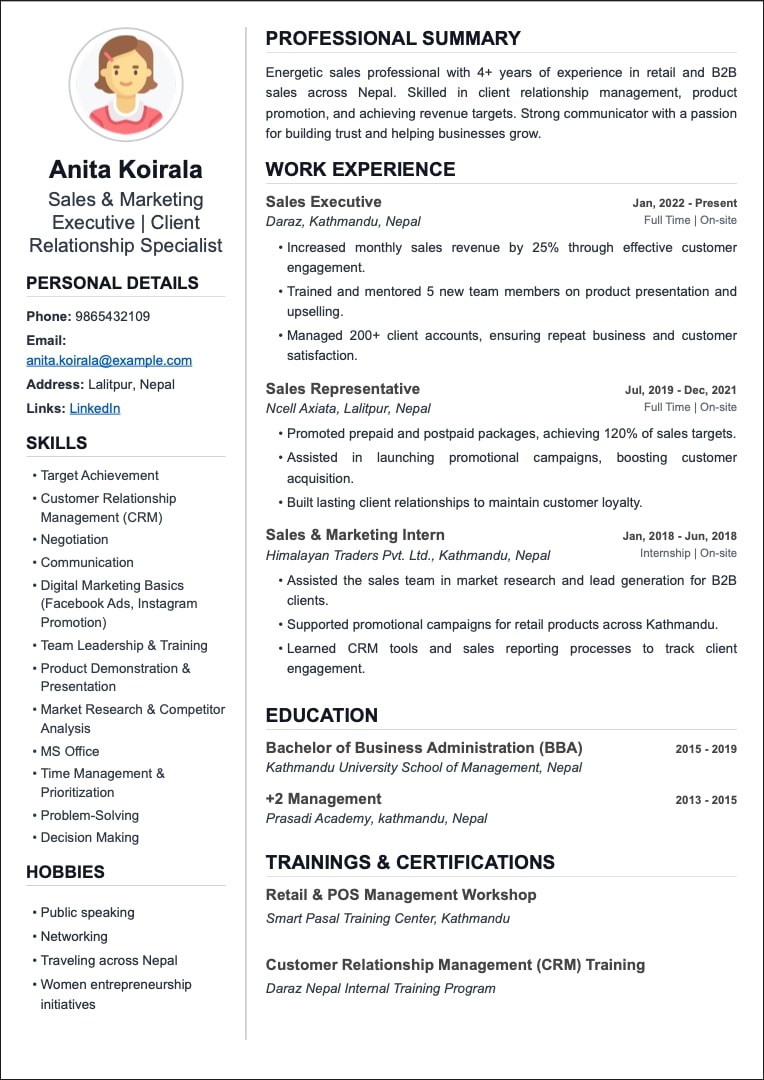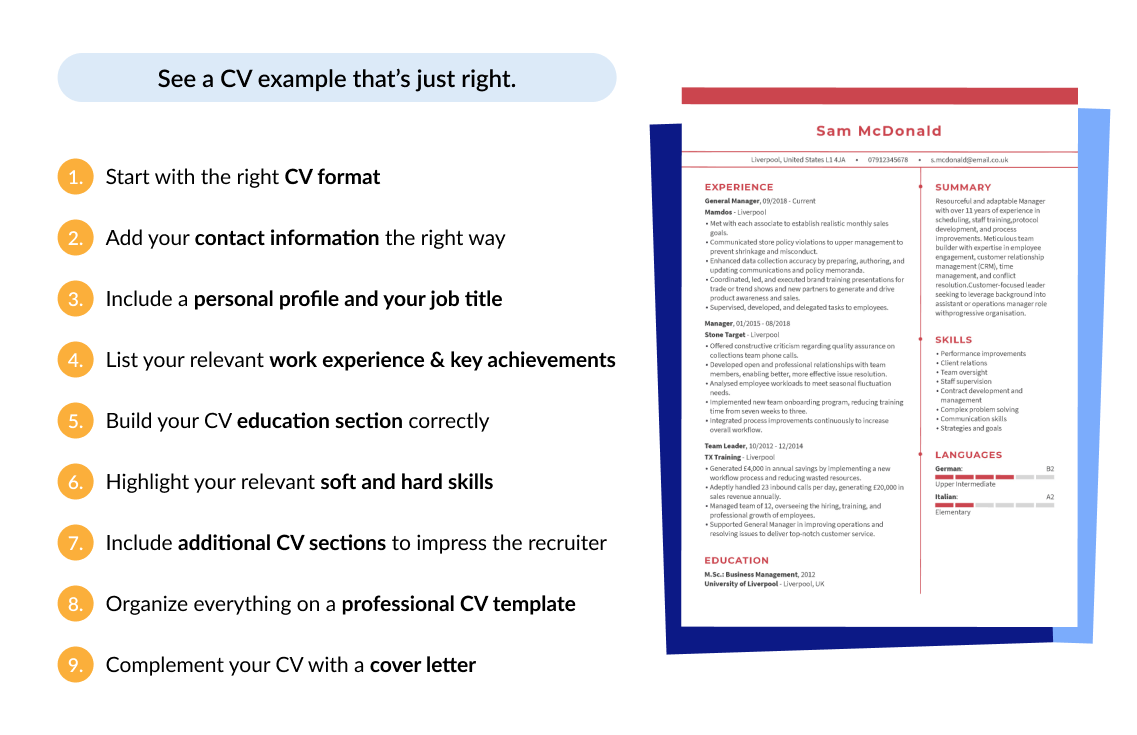Loading...
Our robot is working hard to get everything ready for you!
Our robot is working hard to get everything ready for you!
Writing a CV can seem daunting, but with the right guidance, it's a straightforward process. This guide will walk you through everything you need to know to create a standout CV that gets you noticed by employers.
From choosing the best format to tailoring your CV for specific jobs, we've got you covered. Let's get started!
Want to save time and have your CV ready in 5 minutes? Try our CV builder. It's fast and easy to use. Plus, you'll get ready-made content to add with one click. See 20+ CV templates and create your CV here.


Mero CV
A CV, short for curriculum vitae, is a detailed document that outlines your professional and academic history, including your work experience, education, skills, publications, and achievements.
In the U.S., Canada, and Australia, CVs are mainly used when applying for jobs in academia, research, and medicine, where a full record of your qualifications is important.
In most other parts of the world—including Europe, Asia, Africa, and the Middle East—a CV is the standard document for all job applications. Employers in these regions expect a CV to include personal information, a career summary, and a detailed list of qualifications and work history.
A CV and a resume differ in a few ways:
Now that you know what a CV is, it’s time to build one!
Don’t worry—you don’t need to be a writing expert to make a great CV. All you need is some time, a little focus, and a clear idea of what you’ve done so far in your career.
Follow these easy steps to learn how to make a CV:

The very first step to creating your CV is collecting all your essential career details. Make a list with the following:
Once you have your professional CV template, you can start adding your contact information. Include the following:
An attention-grabbing summary is key to a strong CV. In four sentences or less, highlight your strongest accomplishments and skills. Focus on using this introduction to impress recruiters and get them to read your CV.
See this sample CV summary:
Detail-oriented anthropology researcher with a strong background in ethnographic fieldwork, cultural analysis, and academic writing. Experienced in conducting qualitative and quantitative research across diverse cultural settings, focusing on medical anthropology. Proven ability to manage complex projects, present findings at academic conferences, and publish in peer-reviewed journals. Committed to advancing anthropological knowledge through ethical research practices, interdisciplinary collaboration, and meaningful community engagement.
Your CV should list all your past job positions in reverse-chronological order. Include the job title, company or institution name, employment dates, and locations. Write your duties in bullet points.
If you achieved anything special in the workplace, add that too to show what you can do. Use numbers or percentages to prove how you can contribute to the team.
Take a look at this work experience example:
Project Manager
Day Solutions | London, UK
January 2022 - Present
Pro-tip: Use strong action words to make your ideas stand out and show that you are ready to take charge.
The education section is a crucial part of your CV, especially if applying to a job in academia. Write the degrees you've earned, starting with the highest one. Include the school's name and graduation date. Add any academic honors, awards, theses, or dissertations as well.
Here's an example:
Master of Arts in Anthropology
University of Texas | Austin, TX
Graduated: May 2025
Thesis: “Narratives of Resilience: Cultural Memory and Identity Among Displaced Communities in Central America”
Honors: Dean’s Graduate Honor List, 2023–2024
Bachelor of Arts in Anthropology, Minor in Latin American Studies
Barnard College | New York, NY
Graduated: May 2021
Honors: Magna Cum Laude
Senior Capstone Project: “Traditional Healing Practices in Contemporary Urban Settings”
Pro-tip: If you want to take your academic background to the next level, add relevant coursework!
Make a list including soft, hard, and technical skills to show you're well-rounded. Knowing how to use software and having communication skills can prove to employers that you can do the job and be a team player.
Soft Skills
Hard Skills
Remember, a CV is a detailed account of your career. Any credential that shows your expertise should be included in your document. You can add:
Writing a standout CV becomes easier with a tried and tested template. We have many professionally designed CV templates to choose from. Tailor them to your needs with ease.
CV Examples according to the jobs
CV Examples according to the jobs
CV Examples according to the jobs
CV Examples according to the jobs
Follow these tips to ensure your CV stands out from the competition:
You learned how to create a CV. Now, let's go over some key points:
This article has been reviewed by our editorial team to make sure it follows Mero CV's editorial guidelines. We’re committed to sharing our expertise and giving you trustworthy career advice tailored to your needs. High-quality content is what brings over 1000+ readers to our site every year. But we don't stop there. Our team conducts original research to understand the job market better, and we pride ourselves on being quoted by top universities and prime media outlets from around the world.
Now that you have all the tools to create a standout CV, it's time to put them into action.
Use our professional CV builder to create a standout CV that gets interviews.
Remember: Your CV is your first impression. Take the time to craft it carefully and update it regularly.